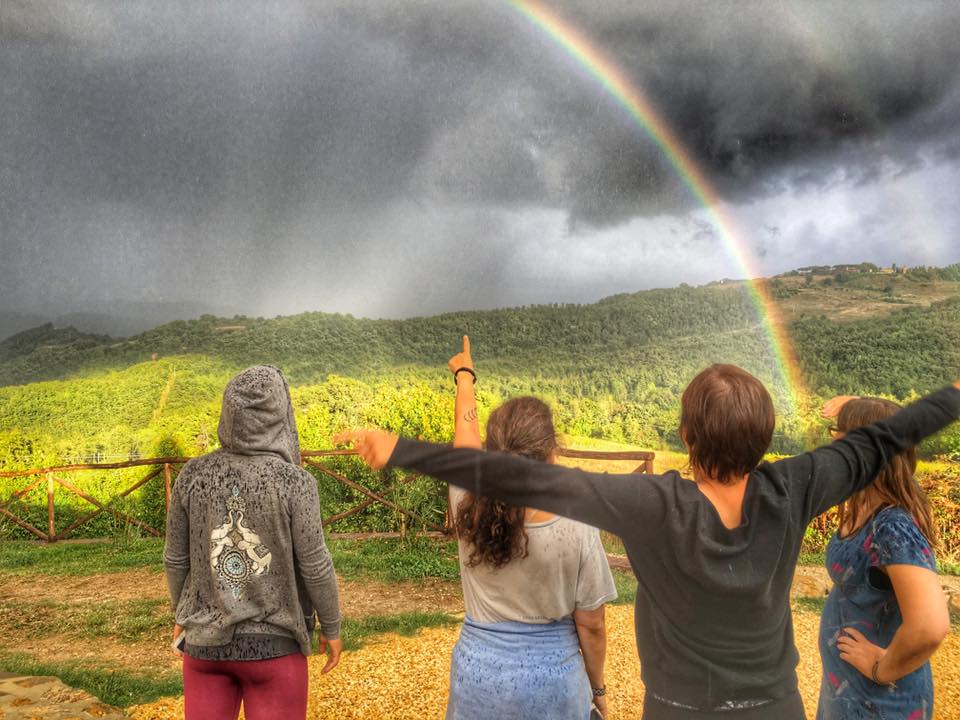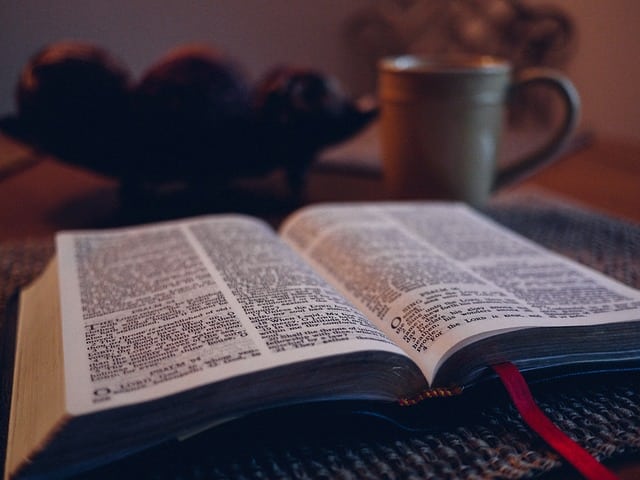There is a beautiful and ancient Jewish tradition of reciting Psalms while watching over a deceased person until burial. A few of us had decided to take turns sitting with our friend Philip’s body overnight. Philip was a handicapped man in our synagogue who was loved and admired by all. When Philip recently died, his death, as his life, brought some unexpected gifts for those close to him.
It was almost 12:30am and the air was thick with the humidity of balmy summer nights. After an eternity of banging on all the windows and doors of the seemingly empty funeral home, which also functioned as the Jewish morgue in town, I suddenly saw lights turn on inside. The door swung open and out stepped a bushy-bearded and bespectacled man with a sweatshirt hood covering his head. Not young, not old, wearing a pair of baggie, well worn, beige Dickies, he stood tall, like me, and cocked his head slightly to one side. Standing in the dim light, he said, “Yes? How can I help you?” gazing quizzically at me from under a knit hat, the kind fishermen wear. It was pulled down on his forehead, resting on a set of overgrown, gray eyebrows. He didn’t’ exactly look your clean cut funeral-home guy, but instead more like a version of the troubled poet John Berryman, or worse, Charles Manson. He was the night guard, or the shomer.
Despite being startled by his appearance, I stepped closer to his face, closer than I would have done in daylight, and decided to be clear about who I was and why I was there, knocking on the building like a madwoman at such an unseemly hour. I told him my name and explained the situation quickly. Speaking while holding the door ajar behind him, but facing away from me, I heard him say “Come this way, then.” I followed him into a dimly lit, cavernous garage, where I could make out the shapes of two large, black hearses, and between them, maybe eight plain pine caskets, stacked ceiling high.
In the big, obscure room, a gray metal desk stood against one wall, and next to it an institutional looking metal chair, with a dark green plastic seat, torn in the corners. The man motioned toward the chair looking at it and not me. I asked, “But where is Phil?” He straightened up and his face brightened. Looking at me now, his shaggy eyebrows raised in what almost seemed like amusement, he pointed to a door behind me, slightly ajar, where all I could see was the beginning of a sleek cement floor and a low, flickering light coming from somewhere further in. “Phil is in there. You don’t want to sit in there.”
Peering, I tried to make out more details from the depths of the room, and in the low luster of the light emanating from what must have been a memorial candle, I noticed the faint outline of a body covered by a sheet. “I’d like to sit closer,” I tried. He sighed, came over to the chair close to me and lifted it over to the door opening, shuffling his feet the way en elderly person might. Then he reached inside the doorframe and turned on the light. “So you can read your psalms,” he said looking right at me.
In the room with the corpse, a bright, florescent ceiling light revealed a platform-like table on a metal pedestal, and now the clear outline of Philip’s body under a white disposable sheet was in plain view. I squinted from the intensity of the light, or maybe it was from the stark reality of the scene in front of me. A pale blue porcelain drain sink from the 1950s sat low on the floor at the foot of the table. There was a long, plastic tube resting on the rim of the sink, looking cloudy from frequent use. I noticed a beige rectangular nametag on top of the covered body. “Thank you,” I said, and smiled, looking to make eye contact, but the shomer had already turned away. “Now you can say your tehilim,” he said, quietly leaving the large, dark room with the coffins, the metal desk, the imposing hearses, and me.
After a while, seated in the door opening with my small softcover Book of Psalms in my lap, my eyes drifted to the metal desk a few feet away. I got up to take a closer look, stretching my legs. Everything was quiet. I wondered where the shomer was and didn’t want him to think I was nosy, which of course I was. Above the desk on the wall was a large cork bulletin board filled with scraps of paper, faded newspaper clippings and cutouts of cartoon strips. In one of the clippings, I recognized a photo of the shomer, a younger looking version, slightly less hairy, posing without a smile, the same melancholy and somber face gazing into the camera. It was a sort of write-up, and even back then he had been doing this job for a long time. On the top of the desk were various plastic figurines lined up, covered in dust suggesting they had been standing in the same spots for decades: a blue Smurf with a miniature white but now more grey plastic flower in his arms and a white hat on his small, round head; a happy troll with what had once been bright pink wild hair, and a 3-inch tall Cinderella in her painted-on gown and slippers and red lipstick. Together with the night guard, these were the silent witnesses in the business of dying. On the desk, a notepad rested under a pencil, the top sheet read: “David, leave Mr. Myrun on the table.”
Instead of sitting back down, I moved compulsively toward the room where Phil’s body lay. What else was in the room? Would there be a particular smell? I knew that the body was washed and dressed in accordance with Jewish tradition by three volunteers or the chevra kadisha, the holy society. Part of their charge is to ensure that the body is protected from desecration – willful or not – until it is buried. The tradition began long ago, back in a time when both men and beasts often messed with the dead. Holy people, these volunteers, performing what’s understood as the greatest mitzvah or good deed there is, since it’s done with no expectations or possibility of favors returned. I had learned from the newspaper clipping that David was also part of the chevra kadisha.
Back in my chair I began to feel tired, and a deep sense of loss and sadness came over me. I felt resigned to the inevitability of the separation from loved ones that death brings.
Suddenly I heard the shuffle of David’s shoes. “Philip was my friend too,” he said quietly. His hands were buried in the wide front pocket of his sweatshirt. “We went to school together, and when he had to go to the nurse’s office I’d often stay with him to help him.” David looked at me and stepped closer, “I would feed him, too. He was a good man.” He fell silent again. His jaw made a slow, grinding movement while he kept his eyes on me. Behind the thick glass of his frames, his gaze drifted off as if absorbed in remembering.
Trying to keep a conversation going, I told him I had noticed the note on his desk, and wondered where Philip’s body would have been, if not on the table. David motioned for me to follow him. Along the wall were stacked six morgue storage lockers, with dull stainless steel fronts where small rectangular label slots sat empty, anticipating their next visitors. Six, large, utilitarian lever handles stood erect by the side of each door, like soldiers prepared to guard God’s precious treasures. “Have you ever seen one of these before?” he asked. He swung the small, square cooler door open and pulled out a drawer, which made a scratchy metallic sound as it rolled out on its tracks. “This is also where we store a body if the funeral cannot take place within 24 hours as is our custom. It sometimes takes family or loved ones more time to get here, and so we wait,” he explained patiently, before quietly walking away.
I read some more psalms, and eventually decided to leave. I got up from my chair and walked to the door leading to the rest of the funeral home. It was darker there and I paused, wondering if I should go look for David to say goodbye. I listened for sounds but everything was still. I thought about how awkward it would be if I found him napping somewhere, or perhaps caught him off guard. He wasn’t used to sharing this space with anyone who moved around. I resigned myself to leaving without saying goodbye. On my way past the desk, I grabbed the pencil that was still on top of the notepad and flipped to an empty page and scribbled a thank you and goodbye. Like a thief in the night, I slipped out the backdoor.
On my way home, I couldn’t help but wonder about David. Had he always been this eccentric? I imagined that as one of the few Jewish kids in school back then in the 1950s, he had probably gravitated toward Phil, who in his own way was an unusual kid. David was obviously smart; in fact, he had seemed a bit of an idiot savant. I wondered, had he ever been married, or was he the kind of man who lived with his mother? What does he do for fun? Who are his friends? His person had moved me, that much I knew.
The next morning, the funeral was scheduled for 9am, with a memorial service in our synagogue, preceding the burial. When I entered the synagogue lobby, I recognized the owners of the mortuary: starched white shirts, smooth black suits and shiny shoes. ”You are the owner of the mortuary, right?” I said, and introduced myself. I added, “I wanted to share something with you about David, your shomer.” The funeral director leaned in as if we were about to share a secret. ”I hope he behaved alright toward you?” he said. Looking up at his smooth skin with its deep bronze color, I could smell the heavy scent of his cologne. “Actually, he was a gentleman, and he made me feel welcome and comfortable. I wanted you to know that.” He looked at me in disbelief. “Really?…” he begun, puzzled. “Well, maybe you can make sure he knows I told you this,” I said and smiled. I wondered how the funeral director treats the eccentric night guard. Do you realize the holiness of your invisible employee? I thought, while making my way into the sanctuary. David, who clocks in years on end, night after night, hidden in the dark like a well-kept secret in God’s pocket.
I dreamt about Philip in the wee hours of that morning. Only it wasn’t just Philip who appeared, but David as well. In the dream the two childhood friends were reunited and their bodies looked young and limber, handsome as they laughed and smiled and flirted with me with exuberant confidence. And in my dream I am warmed deep in my core in a place I can’t even name. I’ve thought that this sensation must be love.
***




“Do you realize the holiness of your invisible employee?” I was moved to tears by that question. How often do we forget the invisible person who cleans our office, who passes the medications in the middle of the night, who wakes the cows for their milking? Beautiful and thought provoking piece, thank you.
Beautiful and profound. Thank you for writing this, but even more, thank you for your holy mitzvah.